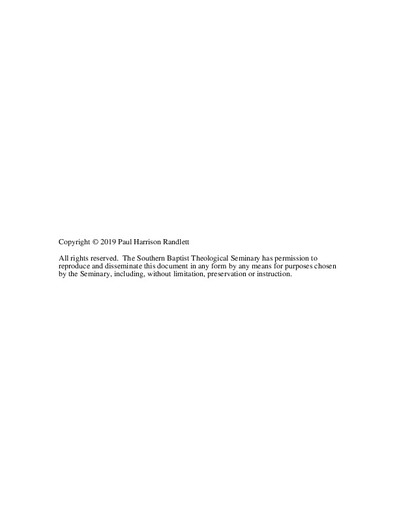| dc.description.abstract | How educational institutions train worship leaders to serve in the twenty-first century evangelical church, particularly churches in the revivalist mold, differs significantly from the methods employed by many academic institutions through much of the twentieth century. Liberty University recognized the paradigm shift in training methods and became an early adopter of a practical, job-focused model of instruction designed to prepare graduates to successfully navigate the new ministry climate.
This dissertation recounts the history of the church music and worship degree programs at Liberty University between 1971 and 2018. Chapter 1 presents an introduction to the study, outlining changing competencies for worship leaders and NASM discussions on change and the church from 1970 to the present. Chapter 2 offers a historical overview of Liberty University and its founder, Jerry Falwell Sr. It traces the life and ministry of Dwight L. Moody, the Moody Bible Institute, the rise of Fundamentalism and the Bible College Movement throughout the first half of the twentieth century. Chapter 3 tracks the cultural and historical climate in which the music and worship programs at Liberty University developed including an overview of the Holiness Movement and the rise of Pentecostalism, the Youth for Christ Movement, the Jesus Movement and the rise of Contemporary Christian Music and Contemporary Worship Music, and a discussion of the worship wars beginning in the early 1990s. Chapter 4 outlines changes in the church music and worship degrees that resulted from changes at the institution. Chapters 5 through 7 present a detailed discussion on the development of the church music and worship degrees from 1971 through 2018. Factors related to the discussion include an in-depth analysis of curriculum, educational philosophy, issues related to faculty hiring, facilities and resources, and significant personalities of each period. The study utilizes interviews with university and departmental administrators and faculty along with individuals instrumental in the establishment of the degrees. Primary documents including departmental meeting minutes, course syllabi, course and degree proposals, course catalogs, reports to the Southern Association of Colleges and Schools (SACS) and the Transnational Association of Christian Colleges and Schools (TRACS), and administrative documents are used to establish context and track revisions to the degrees throughout the period of the study.
The study does not offer conclusions regarding the effectiveness of the degrees but, rather, addresses the educational philosophy of the institution and its leaders along with the actual revisions in how the training of worship leaders changed through the years. | en_US |

